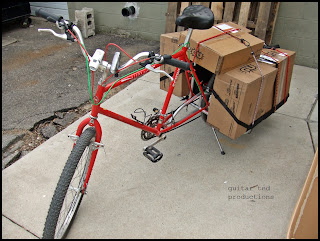 |
| No motor, not "fancy", but it is "Utility". |
Now, while that is cool in and of itself, I find it all somewhat amusing, and totally puzzling when fancy custom bicycles that cost the price of a good used car, (at least in these parts), are proffered up as a "utility bike" that should be seen as a "car replacement option".
Really? (And apparently, I am not the only person that feels this way. See the comment #1 on this Bike Rumor post here)
Ya know, it is great to see the passion, focus, and dedication to utility cycling that these folks show. I don't doubt their enthusiasm and drive one bit, but c'mon! These bicycles are not going to get the "non-cycling public' excited about ditching the Suburban or that aging Caravan. Like the commenter said on the Bike Rumor post, "I did not see a single machine that beat a Trek Soho or similar as an urban bike"
Hey, neither did I.
The thing is, these are geek-bikes for bike-geeks, and by the response from the bike geeks out here that I have seen, it worked. They made bike geeks feel all warm and fuzzy. Not that this is a bad thing, mind you, but it isn't advancing the goal of getting the "non-cycling public" into bikes, or even thinking about thinking about getting on a bike.
 |
| Electric Assist? I don't need no stinkin' electric assist! |
I remember being stopped at a convenience store last summer by a guy who was generally stoked by my rig and the possibilities it presented. Did he get out of his car and go utility bicycling? I don't know, but my lowly rig, and "normal" clothed appearance made it something he could grasp.
The Oregon Manifest wouldn't work here. Maybe it does out there on the West Coast. If so, I apologize for thinking less of it, but here? Ha! Yeah........right. In my opinion, most folks, even cyclists here, are going to be on a similar page to the commenter I referenced.
What I'd like to see is an Oregon Manifest that is "readily perceived by the senses and especially by the sense of sight" as an accessible, realistically priced, practical bike that folks would see as something they would ride for fun and utility. Something not high priced. Something not so exclusive, but inclusive. Something that looks like a bike. (Really, that wouldn't be so bad, would it?)
Works of rideable art are fine and all, but "utility" means something far away from that for most folks. Especially if the folks you want to get out of cars are going to look at them as being something useable. Just my two cents.
Maybe me and the guy commenting on the Bike Rumor post are just daft ninnies that don't get it. But, I'm betting we're on to something here......

